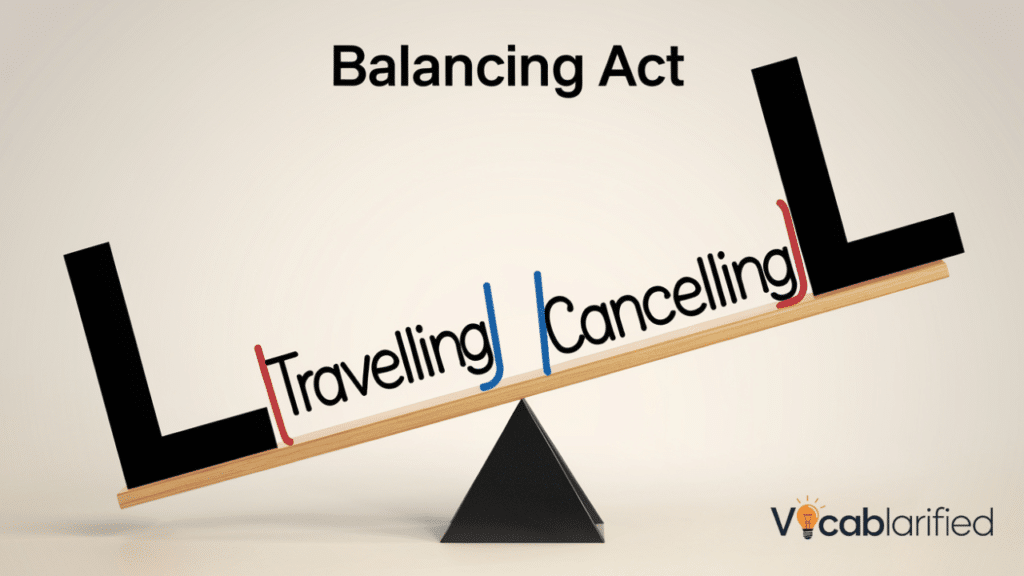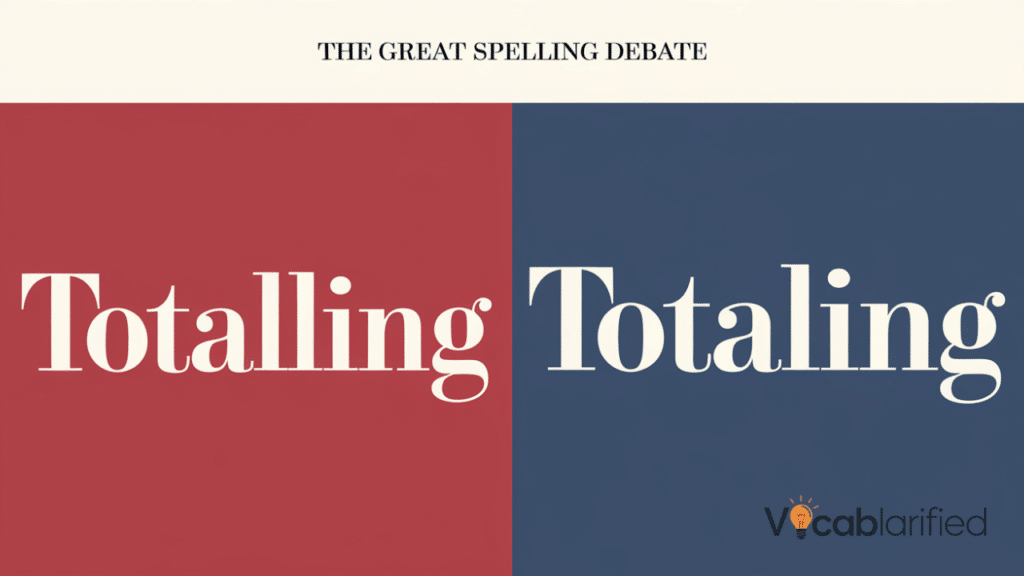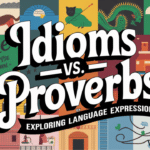The Great Spelling Debate
Have you ever found yourself hesitating over whether to write “totalling” or “totaling” when adding up figures in a financial report? You’re not alone. This seemingly minor difference in spelling has been a source of confusion for many English speakers worldwide. The variation stems from the regional difference between British English and American English, two major variants of the language that often diverge in subtle ways.
A Tale of Two Englishes
British English and American English have evolved separately over centuries, leading to numerous differences in vocabulary, grammar, and spelling. The “totalling” vs. “totaling” debate is just one example of how these linguistic norms can differ across the Atlantic.
In British English, it’s common to see words ending in a single consonant double that consonant when adding suffixes. This rule applies to words like “travel” (travelling) and “cancel” (cancelling). Following this pattern, “total” becomes “totalling” in British usage.

American English, on the other hand, tends to favor simplifying spellings where possible. In many cases, this means keeping the single consonant when adding suffixes. Thus, “totaling” with a single “l” is the preferred spelling in American usage.
You Might Like: Requester or Requestor | Which Spelling to Use?
The Double “L” Dilemma
The use of a double “l” in words like “totalling” isn’t arbitrary. It serves a purpose in British English by indicating that the stress falls on the second syllable of the word. This helps maintain the original pronunciation when suffixes are added.

Consider the following examples:
| Word | British Spelling | American Spelling |
|---|---|---|
| Total | Totalling | Totaling |
| Travel | Travelling | Traveling |
| Cancel | Cancelling | Canceling |
| Label | Labelling | Labeling |
| Model | Modelling | Modeling |
| Signal | Signalling | Signaling |
| Quarrel | Quarrelling | Quarreling |
| Fuel | Fuelling | Fueling |
| Marvel | Marvelling | Marveling |
| Revel | Revelling | Reveling |
Context Matters
While the general rule differentiates between British English and American English, it’s important to note that context can sometimes override these guidelines. For instance, in formal or academic writing, authors might choose to consistently use one style throughout their work, regardless of their geographical location.

Style Guides and Professional Writing
Many organizations and publications have their own style guides that dictate which spelling to use. These guides ensure consistency across all written materials produced by the entity. For example, a British newspaper might mandate the use of “totalling” in all articles, while an American university might require “totaling” in all academic papers.
You Might Like: Potatoes or Potatos | What Is The Difference?
Here’s a table showing the preferred spelling in various style guides:
| Style Guide | Preferred Spelling |
|---|---|
| The Chicago Manual of Style | Totaling |
| Associated Press Stylebook | Totaling |
| Oxford Style Manual | Totalling |
| The Economist Style Guide | Totalling |
| APA Style Guide | Totaling |
| MLA Handbook | Totaling |
| Canadian Press Stylebook | Totalling |
| Guardian and Observer Style Guide | Totalling |
| BBC News Style Guide | Totalling |
| Australian Government Style Manual | Totalling |
The Digital Age Influence
In the age of global communication, the lines between British English and American English are increasingly blurred. Social media, international news outlets, and multinational corporations often expose us to both spellings, sometimes leading to increased confusion.
Practical Applications
Let’s explore how this spelling difference might appear in real-world scenarios.
Imagine Sarah, a British accountant, drafting an email to her American colleague, John:
“Dear John,
I’ve been totalling the expenses for our international branches, and I’ve noticed some discrepancies in the New York office’s reports. Could you please review the attached spreadsheet and confirm if the totaling is correct on your end?
Best regards, Sarah”
In this example, Sarah unconsciously uses both spellings – “totalling” when writing naturally, and “totaling” when referring to John’s potential response, anticipating his American spelling preference.
You Might Like: En Route Or In Route | Which One Is Correct?
The Impact on Search Engine Optimization
For businesses and content creators, understanding the “totalling” vs. “totaling” distinction can be crucial for search engine optimization (SEO). Using both spellings strategically can help capture a wider audience across different English-speaking regions.
Consider the following table showing search volumes for related terms:
| Keyword | Global Monthly Searches |
|---|---|
| Totaling calculator | 12,100 |
| Totalling calculator | 9,900 |
| How to total in Excel | 8,200 |
| Totaling formula | 6,600 |
| Totalling in Google Sheets | 5,400 |
| Totaling vs totalling | 4,800 |
| Totaling function | 3,700 |
| Totalling costs | 3,200 |
| Totaling revenue | 2,900 |
| Totalling profits | 2,500 |
The Role of Spell-Checkers
Modern spell-checking software often recognizes both spellings, but may flag one as incorrect depending on the selected language variant. This can sometimes lead to further confusion, especially for non-native English speakers or those working in multicultural environments.
A Matter of Personal Preference
Despite the general guidelines, many writers develop a personal preference for one spelling over the other. Some may choose to use “totalling” because they find it more aesthetically pleasing, while others might opt for “totaling” for its simplicity.
The Evolution of Language
It’s worth noting that language is constantly evolving. What seems like a firm rule today may change over time as usage patterns shift. The debate over “totalling” vs. “totaling” is part of the broader phenomenon of language evolution and the ongoing simplifying spellings trend in English.
Global English and Linguistic Diversity
As English continues to serve as a global lingua franca, we may see a gradual blending of British English and American English norms. This convergence could eventually lead to more standardized spellings across the English-speaking world.

However, it’s equally possible that regional differences will persist as a way of maintaining linguistic diversity and cultural identity. The “totalling” vs. “totaling” distinction may well remain a subtle marker of regional language varieties.
Conclusion: Embracing Linguistic Flexibility
In the end, whether you choose “totalling” or “totaling” often comes down to your audience, context, and personal or professional guidelines. The key is to be consistent within a given piece of writing and to be aware of the expectations of your readers.
Understanding these linguistic norms not only helps in adding numbers correctly but also in navigating the rich tapestry of the English language. So the next time you find yourself pondering over that extra “l”, remember that you’re participating in a long-standing tradition of regional difference that makes English the diverse and fascinating language it is today.

Emma Carter is an experienced blogger at Vocablarified. She enjoys helping people expand their vocabulary and improve their language skills. With a warm and approachable writing style, Emma makes learning new words fun and accessible. When she’s not writing, she loves reading books and discovering new phrases to share with her readers. Emma is passionate about making language learning an enjoyable journey for everyone.







